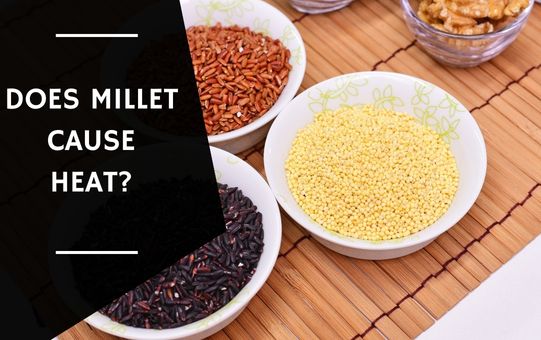Have you heard about the food that causes heat? People experience that eating millet increases their body temperature. But does millet cause heat?
Actually, millet does not increase the body temperature. It is just a type of staple food in various regions all over the world. This grain has numerous benefits for health including fiber and protein enrichment. However, its way of cooking can cause uplift the body temperature, still you can consume this food in moderation and as part of a healthy diet.
This article will examine the science underlying this claim and determine whether or not it is true.
Contents
Why does millet cause heat matter?
There is a common misconception that millet can cause heat in the body, leading some people to avoid consuming it.
However, this belief is not supported by scientific evidence. In fact, millet is a type of grain that is often consumed as a staple food in many parts of the world. It is rich in nutrients and has a number of health benefits, including being a good source of protein and fiber.
It is important to understand that all foods have the potential to affect the body in some way, but this does not mean that they necessarily cause heat.

The body’s internal temperature is regulated by the hypothalamus, which is a part of the brain that controls body temperature. Factors such as the weather, physical activity, and clothing can all affect the body’s internal temperature.
Therefore, the notion that millet causes heat is a myth and should not be a reason to avoid consuming it. As with any food, it is important to consume millet in moderation as part of a balanced diet.
Read Also: Can You Eat Millet Cold?
What is Millet?
Before we dive into the topic of is millets heat for body, let’s first define what millet is. Millet is a type of small-seeded grain that belongs to the grass family.
It is a staple food in many parts of the world, particularly in Africa and Asia. There are several different types of millet, including pearl millet, finger millet, and foxtail millet.
Millet is a good source of nutrients, including carbohydrates, protein, fiber, and a variety of vitamins and minerals. It is also naturally gluten-free, making it a suitable alternative for those with gluten sensitivities.
The Role of Digestion in Body Temperature
While the temperature of the food we eat does not directly affect our body temperature, the process of digestion can have an indirect effect on body temperature.
When we eat, our body begins the process of digestion, which involves breaking down the food into smaller molecules that can be absorbed and used by the body. This process requires energy, which can slightly increase body temperature.
However, this increase in body temperature is temporary and is not caused by the temperature of the food itself. Instead, it is a result of the energy needed to digest and absorb the nutrients in the food.
The Role of Metabolism in Body Temperature
In addition to digestion, metabolism also plays a role in regulating body temperature. Metabolism is the process by which the body converts food into energy.
It is influenced by a variety of factors, including genetics, age, and physical activity level.
Certain foods may be believed to have a warming effect on the body because they are thought to increase metabolism.
For example, spicy foods are often considered to have a warming effect because they can stimulate metabolism and increase body temperature. However, this increase in body temperature is not caused by the temperature of the food itself, but rather by the effect of the food on metabolism.
Read Also: Can You Eat Millet On Keto?
is millet heat for body?
Millet is generally considered a “cooling” or “neutral” food in terms of its effects on the body’s internal temperature, according to traditional Chinese medicine and Ayurveda (ancient Indian medicine). In these systems, foods are classified based on their thermal nature, and millet falls into the category of foods that do not cause an increase in body heat.
So, consuming millet is not believed to produce excess heat in the body, making it suitable for consumption in hot weather or by individuals who are trying to balance their body heat. It is also a good option for people with a tendency towards heat-related conditions.
However, it’s important to note that individual reactions to foods may vary, and some people may still experience heat-related symptoms after consuming millet. If you have specific health concerns or dietary considerations, it’s always best to consult with a healthcare professional or a registered dietitian for personalized advice.
Conclusion
In conclusion, there is no scientific evidence to support the claim that millet causes heat in the body. The temperature of food has no direct effect on the body’s internal temperature, which is regulated by the hypothalamus.
While the process of digestion and metabolism can have an indirect effect on body temperature, this is not caused by the temperature of the food itself.
FAQs | Does Millet Cause Heat?
Here are a few questions related to does millet cause heat.:
does millets produce heat in the body
No, millets do not produce heat in the body. They are considered to be a cooling food and are often recommended for consumption during hot weather or to balance body heat.
does millet increase body heat?
There is limited scientific evidence to support the claim that millet specifically increases body heat. Factors like metabolism and overall diet have a greater impact on body temperature regulation.
which millet is heat for body?
There is no specific millet that is known to generate heat in the body. The concept of certain millets being “heat-producing” is based more on cultural beliefs than scientific evidence.
does millets cause body heat?
No, millet does not cause an increase in body heat. The concept of certain foods causing heat in the body is not supported by scientific evidence. Factors like metabolism and overall diet have a greater influence on body temperature.
does foxtail millet cause heat?
No, foxtail millet does not cause heat. It is a type of grain that is commonly consumed as a staple food in many parts of the world. While it is a nutritious and energy-rich food, it does not have any inherent properties that cause an increase in body temperature or heat generation.
finger millet is heat or cold?
Finger millet (ragi) is considered a “cooling” food in Ayurveda, helping balance body heat and suitable for hot weather. Individual responses may vary, so consult a healthcare professional for personalized advice.

